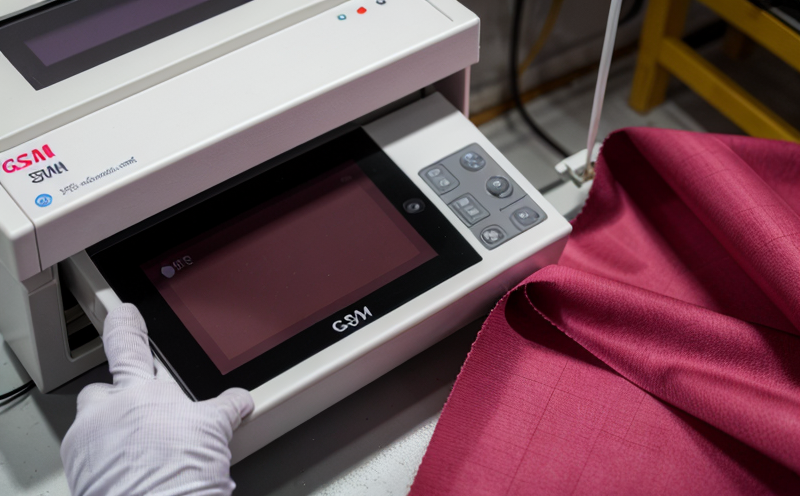ASTM D3777 Fabric Length Measurement
The ASTM D3777 standard method is a critical tool used in the textile industry to ensure consistent quality and compliance with international standards. This test measures the length of fabric samples, which is essential for quality control and ensuring that products meet specified dimensions.
Measurement of fabric length plays a vital role in various stages of the textile manufacturing process, from raw material procurement to final product inspection. Precision in measuring fabric lengths helps manufacturers avoid costly errors, ensures customer satisfaction, and enhances brand reputation. This test is particularly important for weaved fabrics where even minor discrepancies can impact the performance and usability of the finished product.
The ASTM D3777 method specifies the use of an accurate measuring device that can provide repeatable results. The accuracy of these measurements directly influences the overall quality of textile products, which is why this test is widely used in laboratories and manufacturing facilities across sectors such as clothing, home textiles, automotive interiors, and industrial fabrics.
During the ASTM D3777 test, fabric samples are carefully prepared according to standard procedures. Specimens must be cut from larger rolls or sheets of fabric to ensure representativeness. The sample is then laid out on a flat surface, allowing for accurate measurement using calibrated measuring instruments such as a digital ruler or micrometer.
The method requires that the fabric length is measured in a specific direction, typically along the warp and weft axes, to account for any potential stretching or compression. This ensures that the measurements are consistent with industry standards and can be compared reliably across different batches of fabric or between suppliers.
ASTM D3777 also emphasizes the importance of environmental conditions during measurement. Fabric dimensions can change with variations in temperature, humidity, and light exposure. Therefore, it is crucial to perform measurements under controlled conditions to ensure accurate results.
The application of ASTM D3777 extends beyond manufacturing quality control; it is also valuable for research and development (R&D) purposes. Textile scientists can use this test to study the effects of different processing techniques on fabric dimensions, which in turn helps in optimizing production processes. Additionally, procurement departments benefit from using ASTM D3777 as they can ensure that the materials they purchase meet specified length requirements.
In summary, ASTMD3777 is a cornerstone method for textile industries seeking to maintain high standards of quality and compliance. Its precision and reliability make it an indispensable tool in ensuring product consistency and customer satisfaction.
Applied Standards
| Standard Number | Description |
|---|---|
| ASTM D3777 | Standard Practice for Measuring the Length of Woven Fabrics |
| ISO 10524-1 | Textiles — Methods for Determining Dimensions and Dimensional Stability — Part 1: General Principles |
| EN ISO 9073-1 | Determining dimensions of textile fabrics and yarns — Part 1: General principles |
Benefits
The ASTM D3777 fabric length measurement method offers several key benefits to the textile industry. Firstly, it enhances product quality by providing accurate and consistent measurements of fabric dimensions. This ensures that products meet specified length requirements, which is crucial for maintaining brand reputation and customer satisfaction.
Secondly, ASTMD3777 helps in identifying any discrepancies between actual and expected dimensions early in the manufacturing process. Early detection of such issues allows for corrective actions to be taken promptly, thereby reducing waste and rework costs.
In addition to quality control, this test is invaluable for research and development activities. Textile scientists can use ASTMD3777 to study the effects of different processing techniques on fabric dimensions, which helps in optimizing production processes. This leads to more efficient manufacturing practices and innovative product developments.
For procurement departments, ASTMD3777 ensures that materials are received as per contractual specifications. By using this method, they can verify that suppliers deliver fabrics of the correct length, thereby minimizing risks associated with non-compliance.
The precision and reliability of ASTMD3777 also contribute to sustainable textile manufacturing practices. By ensuring accurate measurements, manufacturers can reduce material wastage and improve resource utilization efficiency. This aligns with broader sustainability goals within the industry.
Why Choose This Test
The ASTM D3777 fabric length measurement method is a preferred choice for several reasons. Its rigorous standards and precise procedures ensure that measurements are accurate, repeatable, and reliable. This reliability is critical in industries where even small variations in fabric dimensions can lead to significant quality issues.
One of the key advantages of ASTMD3777 is its applicability across various sectors within the textile industry. Whether it's clothing manufacturers ensuring that garments meet specific length requirements, automotive companies verifying interior fabrics, or industrial fabric producers checking roll lengths, this method provides consistent results.
The test’s emphasis on controlled environmental conditions further enhances its value by accounting for external factors that can influence fabric dimensions. By performing measurements under standardized conditions, the results are more accurate and comparable across different batches or suppliers.
Moreover, ASTMD3777 is a well-established standard in the industry, which adds to its credibility. This reliability fosters trust between manufacturers, suppliers, and customers, ensuring that everyone involved in the supply chain can rely on consistent and accurate measurements.
In conclusion, choosing ASTMD3777 for fabric length measurement offers numerous advantages, including enhanced product quality, reduced waste, optimized production processes, and improved sustainability practices. The method’s widespread acceptance and rigorous standards make it an ideal choice for ensuring compliance with industry norms and maintaining high-quality textile products.





